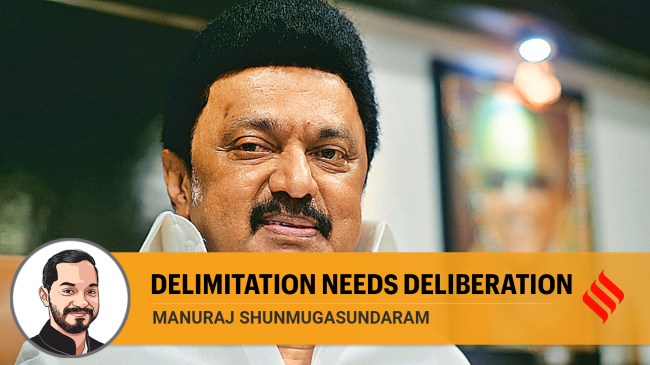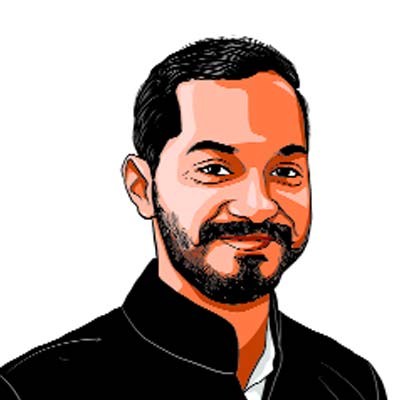Opinion Delimitation needs deliberation. Stalin has set the ball rolling
Given that the 50-year freeze on delimitation will come to an end soon, the Centre is obligated to consider all political views before taking a decision
 The recent move by Stalin to set up a Joint Action Committee of chief ministers and non-BJP leaders has set the ball rolling for a nation-wide debate on delimitation. The battle lines have been drawn before the number of constituencies can be redrawn.
The recent move by Stalin to set up a Joint Action Committee of chief ministers and non-BJP leaders has set the ball rolling for a nation-wide debate on delimitation. The battle lines have been drawn before the number of constituencies can be redrawn.
The Chief Minister of Tamil Nadu and president of the Dravida Munnetra Kazhagam, MK Stalin, has thrown down the gauntlet to the Union government on the issue of delimitation. He has articulated the deepest concerns of not just Tamil Nadu but five southern states as to the future of their representative strength in Parliament. The Union Home Minister was unable to defuse the issue and an all-party meeting held in Chennai this week confirmed that this will be a political issue between states ruled by non-Bharatiya Janata Party-led governments and the BJP.
According to Article 82 of the Constitution of India, upon the completion of each census, the allocation of seats in the Lok Sabha (LS) to states shall be readjusted. This provides a constitutional mandate to revise the strength of the LS in accordance with changes to the population. Consequently, in 1952, 1962 and 1972, successive Parliaments enacted a Delimitation Act and revised the parliamentary strength. In 1976, as population control measures were prioritised by the Centre, a 25-year freeze on the number of LS seats was put in force. Subsequently, the Constitution (84th Amendment) Act, 2002 was enacted to extend the freeze till 2026. The then Union government led by Atal Bihari Vajpayee had justified the extension of the freeze and continuation of parliamentary representation on the basis of the 1971 census to enable states to pursue population stabilisation.
Some states have performed well to bring down fertility rates through targeted interventions, including increasing female literacy, gender empowerment initiatives, enhancing female labour force participation and creating awareness on the National Population Policy. It is ironic that these states are set to lose a significant number of seats in the LS. According to a recent report of the Carnegie Endowment for International Peace, the following nine states stand to lose between one and eight LS seats: Uttarakhand, Punjab, Himachal Pradesh, Karnataka, West Bengal, Odisha, Kerala, Andhra Pradesh, Telangana and Tamil Nadu. The five southern states, especially, stand to lose 26 seats altogether.
With the freeze ending in 2026, the first Census thereafter will be used to determine the number of seats in the LS, unless the present freeze is extended by way of a constitutional amendment like in 2002. The Union government is expected to set up a Delimitation Commission consisting of a retired judge to provide a report based on changes to the population. Once the Commission provides its report, courts cannot interfere. This makes it necessary for the issue to be raised earlier.
In 1950, India’s population was 359 million people and we had 500 LS members. In 1967 the number of LS members grew to 521 while our population grew to 522 million people. In 1976, the population increased to 637 million while the LS was expanded to accommodate 543 members. Since 1976, India’s population has more than doubled to 1.45 billion now, while the LS has remained constant at 543. Between 1950 and 2025, India’s population has grown by four times but the LS changed by less than 10 per cent.
If we were to increase the number of constituencies now, it is imperative to understand what the next three decades look like. According to a UN report, the population of India is expected to peak at 1.7 billion before it starts declining from 2060. This begs the question why there is a need now to increase the number of seats in the LS when the population may only grow by 20 per cent from the present number over the next 35 years or so.
Union Home Minister Amit Shah, during a media interaction, recently said that delimitation would not adversely affect the interest of the states and changes to parliamentary representation would happen “pro rata”. There has been no further clarification from the Centre, leading Stalin to term this vague and unclear. Given that the 50-year freeze on delimitation will come to an end soon, the Union government is obligated to consider all political views before taking a decision. The recent move by Stalin to set up a Joint Action Committee of chief ministers and non-BJP leaders has set the ball rolling for a nation-wide debate on delimitation. The battle lines have been drawn before the number of constituencies can be redrawn.
The writer is an advocate practising in Madras High Court and spokesperson, DMK



